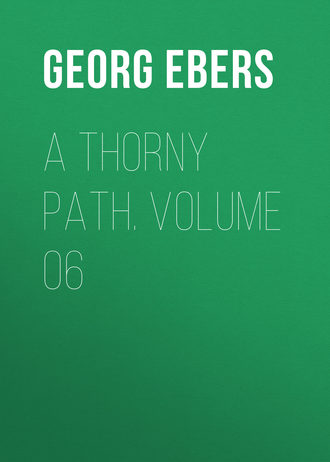
Georg Ebers
A Thorny Path. Volume 06
The Greek bowed his head in silence, as if conscious of his short- comings; the Egyptian's eyes flashed, and, with an amazingly low bend of his supple spine, he announced that, more than three hours since, he had discovered a most abominable caricature in clay, representing Caesar as a soldier in a horrible pygmy form.
"And the perpetrator," snarled Caracalla, listening with a scowl for the reply.
Zminis explained that great Caesar himself had commanded his attendance just as he hoped to find the traces of the criminal, and that, while he was waiting, more than three precious hours had been lost. At this Caracalla broke out in a fury:
"Catch the villain! And let me see his insolent rubbish. Where are your eyes? You bungling louts ought to protect me against the foul brood that peoples this city, and their venomous jests. Past grievances are forgotten. Set the painter's father and brother at liberty. They have had a warning. Now I want something new. Something new, I say; and, above all, let me see the ringleaders in chains; the man who nailed up the rope, and the caricaturists. We must have them, to serve as an example to the others."
Aristides thought that the moment had now come for displaying his severity, and he respectfully but decidedly represented to Caesar that he would advise that the gem-cutter and his son should be kept in custody. They were well-known persons, and too great clemency would only aggravate the virulence of audacious tongues. The painter was free, and if his relatives were also let out of prison, there was nothing to prevent their going off to the other end of the world. Alexandria was a seaport, and a ship would carry off the criminals before a man could turn round.
At this the emperor wrathfully asked him whether his opinion had been invited; and the cunning Egyptian said to himself that Caracalla was anxious to spare the father and his sons for the daughter's sake. And yet Caesar would surely wish to keep them in safety, to have some hold over the girl; so he lied with a bold face, affirming that, in obedience to the law of the land, he had removed Heron and Philip, at any rate for the moment, beyond the reach of Caesar's mercy. They had in the course of the night been placed on board a galley and were now on the way to Sardinia. But a swift vessel should presently be sent to overtake it and bring them back.
And the informer was right, for Caesar's countenance brightened. He did, indeed, blame the Egyptian's overhasty action; but he gave no orders for following up the galley.
Then, after reflecting for a short time, he said:
"I do not find in either of you what I require; but at a pinch we are fain to eat moldy bread, so I must need choose between you two. The one who first brings me that clay figure, and the man who modeled it, in chains and bonds, shall be appointed chief of the night-watch."
Meanwhile Alexander had entered the room. As soon as Caracalla saw him, he beckoned to him, and the artist informed him that he had made good use of his time and had much to communicate. Then he humbly inquired as to the clay figure of which Caesar was speaking, and Caracalla referred him to Zminis. The Egyptian repeated what the Magian had told him.
Alexander listened calmly; but when Zminis ceased speaking, the artist took a deep breath, drew himself up, and pointing a contemptuous finger at the spy, as if his presence poisoned the air, he said: "It is that fellow's fault, great Caesar, if the citizens of my native town dare commit such crimes. He torments and persecutes them in your name. How many a felony has been committed here, merely to scoff at him and his creatures, and to keep them on the alert! We are a light-headed race. Like children, we love to do the forbidden thing, so long as it is no stain on our honor. But that wretch treats all laughter and the most innocent fun as a crime, or so interprets it that it seems so. From this malignant delight in the woes of others, and in the hope of rising higher in office, that wicked man has brought misery on hundreds. It has all been done in thy great name, O Caesar! No man has raised you up more foes than this wretch, who undermines your security instead of protecting it."
Here Zminis, whose swarthy face had become of ashy paleness, broke out in a hoarse tone: "I will teach you, and the whole rabble of traitors at your back—"
But Caesar wrathfully commanded him to be silent, and Alexander quietly went on: "You can threaten, and you will array all your slanderous arts against us, I know you. But here sits a sovereign who protects the innocent—and I and mine are innocent. He will set his heel on your head when he knows you—the curse of this city—for the adder that you are! He is deceiving you now in small things, great Caesar, and later he will deceive you in greater ones. Listen now how he has lied to you. He says he discovered a caricature of your illustrious person in the guise of a soldier. Why, then, did he not bring it away from the place where it could only excite disaffection, and might even mislead those who should see it into the belief that your noble person was that of a dwarf? The answer is self-evident. He left it to betray others into further mockery, to bring them to ruin."
Caesar had listened with approval, and now sternly asked the Egyptian:
"Did you see the image?"
"In the Elephant tavern!" yelled the man.
But Alexander shook his head doubtfully, and begged permission to ask the Egyptian a question. This was granted, and the artist inquired whether the soldier stood alone.
"So far as I remember, yes," replied Zminis, almost beside himself.
"Then your memory is as false as your soul!" Alexander shouted in his face, "for there was another figure by the soldier's side. The clay, still wet, clung to the same board as the figure of the soldier, modeled by the same hand. No, no, my crafty fellow, you will not catch the workman; for, being warned, he is already on the high-seas."
"It is false!" shrieked Zminis.
"That remains to be proved," said Alexander, scornfully.—"Allow me now, great Caesar, to show you the figures. They have been brought by my orders, and are in the anteroom-carefully covered up, of course, for the fewer the persons who see them the better."
Caracalla nodded his consent, and Alexander hurried away; the despot heaping abuse on Zminis, and demanding why he had not at once had the images removed. The Egyptian now confessed that he had only heard of the caricature from a friend, and declared that if he had seen it he should have destroyed it on the spot. Macrinus here tried to excuse the spy, by remarking that this zealous official had only tried to set his services in a favorable light. The falsehood could not be approved, but was excusable. But he had scarcely finished speaking, when his opponent, the praetor, Lucius Priscillianus, observed, with a gravity he but rarely displayed:
"I should have thought that it was the first duty of the man who ought to be Caesar's mainstay and representative here, to let his sovereign hear nothing but the undistorted truth. Nothing, it seems to me, can be less excusable than a lie told to divine Caesar's face!"
A few courtiers, who were out of the prefect's favor, as well as the high-priest of Serapis, agreed with the speaker. Caracalla, however, paid no heed to them, but sat with his eyes fixed on the door, deeply wounded in his vanity by the mere existence of such a caricature.
He had not long to wait. But when the wrapper was taken off the clay figures, he uttered a low snarl, and his flushed face turned pale. Sounds of indignation broke from the bystanders; the blood rose to his cheeks again, and, shaking his fist, he muttered unintelligible threats, while his eyes wandered again and again to the caricatures. They attracted his attention more than all else, and as in an April day the sky is alternately dark and bright, so red and white alternated in his face. Then, while Alexander replied to a few questions, and assured him that the host of the "Elephant" had been very angry, and had gladly handed them over to him to be destroyed, Caracalla seemed to become accustomed to them, for he gazed at them more calmly, and tried to affect indifference. He inquired of Philostratus, as though he wished to be informed, whether he did not think that the artist who had modeled these figures must be a very clever follow; and when the philosopher assented conditionally, he declared that he saw some resemblance to himself—in the features of the apple-dealer. And then he pointed to his own straight legs, only slightly disfigured by an injury to the ankle, to show how shamefully unfair it was to compare them with the lower limbs of a misshapen dwarf. Finally, the figure of the apple-dealer—a hideous pygmy form, with the head of an old man, like enough to his own—roused his curiosity. What was the point of this image? What peculiarity was it intended to satirize? The basket which hung about the neck of the figure was full of fruit, and the object he held in his hand might be an apple, or might be anything else.
With eager and constrained cheerfulness, he inquired the opinion of his "friends," treating as sheer flattery a suggestion from his favorite, Theocritus, that this was not an apple-dealer, but a human figure, who, though but a dwarf in comparison with the gods, nevertheless endowed the world with the gifts of the immortals.
Alexander and Philostratus could offer no explanation; but when the proconsul, Julius Paulinus, observed that the figure was offering the apples for money, as Caesar offered the Roman citizenship to the provincials, he knew for what, Caracalla nodded agreement.
He then provisionally appointed Aristides to the coveted office. The Egyptian should be informed as to his fate. When the prefect was about to remove the figures, Caesar hastily forbade it, and ordered the bystanders to withdraw. Alexander alone was commanded to remain. As soon as they were together, Caesar sprang up and vehemently demanded to know what news he had brought. But the young man hesitated to begin his report. Caracalla, of his own accord, pledged his word once more to keep his oath, and then Alexander assured him that he knew no more than Caesar who were the authors of the epigrams which he had picked up here and there; and, though the satire they contained was venomous in some cases, still he, the sovereign of the world, stood so high that he could laugh them to scorn, as Socrates had laughed when Aristophanes placed him on the stage.
Caesar declared that he scorned these flies, but that their buzzing annoyed him.
Alexander rejoiced at this, and only expressed his regret that most of the epigrams he had collected turned on the death of Caesar's brother Geta. He knew now that it was rash to condemn a deed which—
Here Caesar interrupted him, for he could not long remain quiet, saying sternly:
"The deed was needful, not for me, but for the empire, which is dearer to me than father, mother, or a hundred brothers, and a thousand times dearer than men's opinions. Let me hear in what form the witty natives of this city express their disapproval."
This sounded so dignified and gracious that Alexander ventured to repeat a distich which he had heard at the public baths, whither he had first directed his steps. It did not, however, refer to the murder of Geta, but to the mantle-like garment to which Caesar owed the nickname of Caracalla. It ran thus:
"Why should my lord Caracalla affect a garment so ample?
'Tis that the deeds are many of evil he needs to conceal."
At this Caesar laughed, saying: "Who is there that has nothing to conceal? The lines are not amiss. Hand me your tablets; if the others are no worse—"
"But they are," Alexander exclaimed, anxiously, and I only regret that I should be the instrument of your tormenting yourself—"
"Tormenting?" echoed Caesar, disdainfully. "The verses amuse me, and I find them most edifying. That is all. Hand me the tablets."
The command was so positive, that Alexander drew out the little diptych, with the remark that painters wrote badly, and that what he had noted down was only intended to aid his memory. The idea that Caesar should hear a few home-truths through him had struck him as pleasant, but now the greatness of the risk was clear to him. He glanced at the scrawled characters, and it occurred to him that he had intended to change the word dwarf in one line to Caesar, and to keep the third and most trenchant epigram from the emperor. The fourth and last was very innocent, and he had meant to read it last, to mollify him. So he did not wish to show the tablets. But, as he was about to take them back, Caracalla snatched them from his hand and read with some difficulty:
"Fraternal love was once esteemed
A virtue even in the great,
And Philadelphos then was deemed
A name to grace a potentate.
But now the dwarf upon the throne,
By murder of his mother's son,
As Misadelphos must be known."
"Indeed!" murmured Caesar, with a pale face, and then he went on in a low, sullen tone: "Always the same story—my brother, and my small stature. In this town they follow the example of the barbarians, it would seem, who choose the tallest and broadest of their race to be king. If the third epigram has nothing else in it, the shallow wit of your fellow-citizens is simply tedious.—Now, what have we next? Trochaics! Hardly anything new, I fear!—There is the water-jar. I will drink; fill the cup." But Alexander did not immediately obey the command so hastily given; assuring Caesar that he could not possibly read the writing, he was about to take up the tablets. But Caesar laid his hand on them, and said, imperiously: "Drink! Give me the cup."
He fixed his eyes on the wax, and with difficulty deciphered the clumsy scrawl in which Alexander had noted down the following lines, which he had heard at the "Elephant"
"Since on earth our days are numbered,
Ask me not what deeds of horror
Stain the hands of fell Tarautas.
Ask me of his noble actions,
And with one short word I answer,
'None!'-replying to your question
With no waste of precious hours."
Alexander meanwhile had done Caracalla's bidding, and when he had replaced the jar on its stand and returned to Caesar, he was horrified; for the emperor's head and arms were shaking and struggling to and fro, and at his feet lay the two halves of the wax tablets which he had torn apart when the convulsion came on. He foamed at the mouth, with low moans, and, before Alexander could prevent him, racked with pain and seeking for some support, he had set his teeth in the arm of the seat off which he was slipping. Greatly shocked, and full of sincere pity, Alexander tried to raise him; but the lion, who perhaps suspected the artist of having been the cause of this sudden attack, rose on his feet with a roar, and the young man would have had no chance of his life if the beast had not happily been chained down after his meal. With much presence of mind, Alexander sprang behind the chair and dragged it, with the unconscious man who served him as a shield, away from the angry brute.
Galen had urged Caesar to avoid excess in wine and violent emotions, and the wisdom of the warning was sufficiently proved by the attack which had seized him with such fearful violence, just when Caracalla had neglected it in both particulars. Alexander had to exert all the strength of his muscles, practised in the wrestling-school, to hold the sufferer on his seat, for his strength, which was not small, was doubled by the demons of epilepsy. In an instant the whole Court had rushed to the spot on hearing the lion's roar of rage, which grew louder and louder, and could be heard at no small distance, and then Alexander's shout for help. But the private physician and Epagathos, the chamberlain, would allow no one to enter the room; only old Adventus, who was half blind, was permitted to assist them in succoring the sufferer. He had been raised by Caracalla from the humble office of letter-carrier to the highest dignities and the office of his private chamberlain; but the leech availed himself by preference of the assistance of this experienced and quiet man, and between them they soon brought Caesar to his senses. Caesar then lay pale and exhausted on a couch which had hastily been arranged, his eyes fixed on vacancy, scarcely able to move a finger. Alexander held his trembling hand, and when the physician, a stout man of middle age, took the artist's place and bade him retire, Caracalla, in a low voice, desired him to remain.
As soon as Caesar's suspended faculties were fully awake again, he turned to the cause of his attack. With a look of pain and entreaty he desired Alexander to give him the tablets once more; but the artist assured him— and Caracalla seemed not sorry to believe—that he had crushed the wax in his convulsion. The sick man himself no doubt felt that such food was too strong for him. After he had remained staring at nothing in silence for some time, he began again to speak of the gibes of the Alexandrians. Surrounded as he was by servile favorites, whose superior he was in gifts and intellect, what had here come under his notice seemed to interest him above measure.
He desired to know where and from whom the painter had got these epigrams. But again Alexander declared that he did not know the names of the authors; that he had found one at the public baths, the second in a tavern, and the third at a hairdresser's shop. Caesar looked sadly at the youth's abundant brown curls which had been freshly oiled, and said: "Hair is like the other good gifts of life. It remains fine only with the healthy. You, happy rascal, hardly know what sickness means!" Then again he sat staring in silence, till he suddenly started up and asked Alexander, as Philostratus had yesterday asked Melissa:
"Do you and your sister belong to the Christians?"
When he vehemently denied it, Caracalla went on: "And yet these epigrams show plainly enough how the Alexandrians feel toward me. Melissa, too, is a daughter of this town, and when I remember that she could bring herself to pray for me, then—My nurse, who was the best of women, was a Christian. I learned from her the doctrine of loving our enemies and praying for those who despitefully treat us. I always regarded it as impossible; but now—your sister—What I was saying just now about the hair and good health reminds me of another speech of the Crucified one which my nurse often repeated—how long ago!—'To him that hath shall be given, and from him that hath not shall be taken even that which he hath.' How cruel and yet how wise, how terribly striking and true! A healthy man! What more can he want, and what abundant gifts that best of all gifts will gain for him! If he is visited by infirmity—only look at me!—how much misery I have suffered from this curse, terrible enough in itself, and tainting everything with the bitterness of wormwood!"
He laughed softly but scornfully, and continued: "But I! I am the sovereign of the universe. I have so much—oh yes, so much!—and for that reason more shall be given to me, and my wildest wishes shall be satisfied!"
"Yes, my liege!" interrupted Alexander, eagerly. "After pain comes pleasure!
'Live, love, drink, and rejoice,
And wreath thyself with me!'
sings Sappho, and it is not a bad plan to follow Anakreon's advice, even at the present day. Think of the short suffering which now and then embitters for you the sweet cup of life, as being the ring of Polykrates, with which you appease the envy of the gods who have given you so much. In your place, eternal gods! how I would enjoy the happy hours of health, and show the immortals and mortals alike how much true and real pleasure power and riches can procure!"
The emperor's weary eyes brightened, and with the cry—
"So will I! I am still young, and I have the power!" he started suddenly to his feet. But he sank back again directly on the couch, shaking his head as if to say, "There, you see what a state I am in!" The fate of this unhappy man touched Alexander's heart even more deeply than before.
His youthful mind, which easily received fresh impressions, forgot the deeds of blood and shame which stained the soul of this pitiable wretch. His artistic mind was accustomed to apprehend what he saw with his whole soul and without secondary considerations, as if it stood there to be painted; and the man that lay before him was to him at that moment only a victim whom a cruel fate had defrauded of the greatest pleasures in life. He also remembered how shamelessly he and others had mocked at Caesar. Perhaps Caracalla had really spilled most of the blood to serve the welfare and unity of the empire.
He, Alexander, was not his judge.
If Glaukias had seen the object of his derision lying thus, it certainly would never have occurred to him to represent him as a pygmy monster. No, no! Alexander's artistic eye knew the difference well between the beautiful and the ugly—and the exhausted man lying on the divan, was no hideous dwarf. A dreamy languor spread over his nobly chiselled features An expression of pain but rarely passed over them, and Caesar's whole appearance reminded the painter of the fine Ephesian gladiator hallistos as he lay on the sand, severely wounded after his last fight, awaiting the death-stroke. He would have liked to hasten home and fetch his materials to paint the likeness of the misjudged man, and to show it to the scoffers.
He stood silent, absorbed in studying the quiet face so finely formed by Nature and so pathetic to look at. No thoroughly depraved miscreant could look like that. Yet it was like a peaceful sea: when the hurricane should break loose, what a boiling whirl of gray, hissing, tossing, foaming waves would disfigure the peaceful, smooth, glittering surface!
And suddenly the emperor's features began to show signs of animation. His eye, but now so dull, shone more brightly, and he cried out, as if the long silence had scarcely broken the thread of his ideas, but in a still husky voice:
"I should like to get up and go with you, but I am still too weak. Do you go now, my friend, and bring me back fresh news."
Alexander then begged him to consider how dangerous every excitement would be for him; yet Caracalla exclaimed, eagerly:
"It will strengthen me and dome good! Everything that surrounds me is so hollow, so insipid, so contemptible—what I hear is so small. A strong, highly spiced word, even if it is sharp, refreshes me—When you have finished a picture, do you like to hear nothing but how well your friends can flatter?"
The artist thought he understood Caesar. True to his nature, always hoping for the best, he thought that, as the severe judgment of the envious had often done him (Alexander) good, so the sharp satire of the Alexandrians would lead Caracalla to introspection and greater moderation; he only resolved to tell the sufferer nothing further that was merely insulting.
When he bade him farewell, Caracalla glanced up at him with such a look of pain that the artist longed to give him his hand, and speak to him with real affection. The tormenting headache which followed each convulsion had again come on, and Caesar submitted without resistance to what the physician prescribed.
Alexander asked old Adventus at the door if he did not think that the terrible attack had been brought on by annoyance at the Alexandrians' satire, and if it would not be advisable in the future not to allow such things to reach the emperor's ear; but the man, looking at him in surprise with his half-blind eyes, replied with a brutal want of sympathy that disgusted the youth: "Drinking brought on the attack. What makes him ill are stronger things than words. If you yourself, young man, do not suffer for Alexandrian wit, it will certainly not hurt Caesar!"
Alexander turned his back indignantly on the chamberlain, and he became so absorbed in wondering how it was possible that the emperor, who was cultivated and appreciated what was beautiful, could have dragged out of the dust and kept near him two such miserable 'creatures as Theocritus and this old man, that Philostratus, who met him in the next room, had almost to shout at him.
Philostratus informed him that Melissa was staying with the chief priest's wife; but just as he was about to inquire curiously what had passed between the audacious painter and Caesar—for even Philostratus was a courtier—he was called away to Caracalla.







